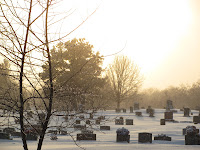When people ask me which season I like best, I have a difficult time deciding, but usually settle for whichever season is coming next. This is not due to dissatisfaction, but the excitement for what is just around the corner, because I haven't been able to experience the joys that come with it for 3/4 of a year.
Sometimes, it seems that all people do is hate the season they are in and long for the opposite. Winter in particular seems generally despised by the public. And I can understand why. The bitter cold combined with a confinement to buildings and at least 3" of bundling in order to resemble any sort of comfort is bad enough. But once you've added the effects of a runny nose, dry skin and an army of illnesses marching around, we have a lot to complain about.
Yet I wonder if we spend as much time remarking on the marvels of winter as we do the inconveniences. How often do we observe the intricate designs of frost on the window, or the way each individual snowflake falls, gently kissing the earth and resting like a soft white blanket? Do we consider the birds, who sit in trees, vulnerable to the mighty north wind due to the lack of leaves? They sing sweetly, welcoming sunshine and the new day. Do we pause to consider that though the sun is far away, it still manages to come up and go down, bringing warmth and melting away the frozen waters, even when the temperature wouldn't allow for it?
What better excuse can you have to grab a sled (or piece of cardboard) and let yourself slide down a hill? When else can you ski down a mountain? How much better does it feel to sit by the fire, drinking hot chocolate and reading a wonderful book, when you know that the earth lies in frozen silence outside? And how much more can we appreciate the growth of spring, the warmth of summer, and the colors of fall if we did not know the disparities of winter?
I know that we have a wonderful Creator when I witness these things and ask these questions. There is such variety, such deep beauty, and such care in every plant, animal and cloud. I thank God for his amazing creation and the chance I have to enjoy it. I know it can be tough at times and we feel as though we are suffering through everlasting winters, but it is important to remember that good things still exist, the sun will rise again, and spring is just around the corner.




